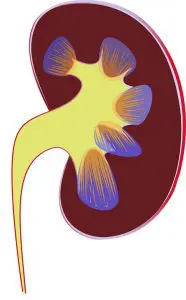Your kidneys are very important organs in your body. Taking proper care of them will help you live better and longer. Many people don’t understand kidney disease or how to prevent it. For National Kidney Disease Month, you can learn how to better care for your kidneys and prevent disease.
Get Tested
 Kidney failure is a slow and progressive disease that usually has no noticeable symptoms. Kidney disease awareness is important. Unless your kidneys have been injured in an accident, you may not know you have kidney disease without medical testing. Your doctor can perform a few types of tests to determine kidney function. These are usually blood tests or urine tests.
Kidney failure is a slow and progressive disease that usually has no noticeable symptoms. Kidney disease awareness is important. Unless your kidneys have been injured in an accident, you may not know you have kidney disease without medical testing. Your doctor can perform a few types of tests to determine kidney function. These are usually blood tests or urine tests.
The blood test for kidney function is called glomular filtration rate or GFR. This measures the amount of creatine in your blood. Creatine is a waste product produced by working muscles. Your kidneys are responsible for filtering this waste from the blood. If the kidneys are not working properly, this acid will build up to unsafe levels in the blood stream.
The urine test for kidney function is called albumin-to-creatine ratio or ACR. The urine is tested for the protein albumin. This protein that should not be found in urine. If the test is positive, it indicates your kidneys are not functioning as well as they should.
There are five stages of disease that lead to kidney failure. There is no way to correct full kidney failure, so it is a life-threatening disease. The best option for a person in the advanced stages is a kidney transplant. Health can be maintained with dialysis, but this does not heal the kidneys.
Diabetes and Sugar
Diabetes is one of the leading causes of kidney failure. When you have diabetes, your body has trouble maintaining healthy blood sugar levels. Your kidneys are responsible for filtering your blood, so when you have high blood sugar your kidneys are under a lot of pressure to balance your system. They eventually become overloaded and begin to fail.
There are many things that may contribute to developing diabetes. Sometimes the disease is genetic, and there isn’t much you can do about that. Most diabetes, however, is brought on by a poor diet. Excess sugar in the diet is one of the leading causes of diabetes. It is important to avoid excess sugar. The American Heart Association recommends that children consume no more than six teaspoons of added sugar per day. This is also a good rule for adults to follow. Diabetes can affect a person of any age. The sooner you take steps to avoid it, the healthier your kidneys will be.
Salt and Blood Pressure
Blood pressure also has a major impact on kidney function. When blood pressure is high, more blood is forced through the sensitive tissues of the kidney faster. Over time, this may damage the kidney tissue that filters the blood. This tissue is very difficult to heal once damaged.
Too much sodium in the diet contributes to high blood pressure. Salt may also pose a danger to the kidneys directly. Sometimes minerals like sodium will harden in the kidneys. The result is a kidney stone. The kidney eventually forces the stone through the kidney tissue. The process is very painful. It may also damage the kidney tissue, which reduces function. The damage caused by passing a kidney stone often does not heal. A scar will form that is never able to filter any blood.
You do not have to eliminate all salt from your diet, but you should keep it to a healthy level. This means not adding salt to most foods and avoiding processed foods already high in salt. You can help balance sodium levels by also getting plenty of potassium from food and drinking plenty of water each day.
Drinking Too Much
 Your kidneys are responsible for getting toxic substances out of your blood stream. Alcohol is highly toxic to the body, so your kidneys work extra hard to get rid of it. When you drink too much, you put strain on your kidneys and may damage them.
Your kidneys are responsible for getting toxic substances out of your blood stream. Alcohol is highly toxic to the body, so your kidneys work extra hard to get rid of it. When you drink too much, you put strain on your kidneys and may damage them.
Alcohol also dehydrates you. Your kidneys’ other job is to maintain the right balance of water in your body. Consuming alcohol can make this job much more difficult. Over time, this may result in lost kidney function.
It is important to know how much is too much. Three drinks or less per day is considered safe for your body and is unlikely to cause serious problems.
Your diet has a lot to do with your kidney health. By maintaining a healthy weight, avoiding alcohol and smoking and choosing healthy foods most of the time, you can keep both your kidneys functioning for your entire life. Many of the conditions that lead to kidney disease are preventable.




